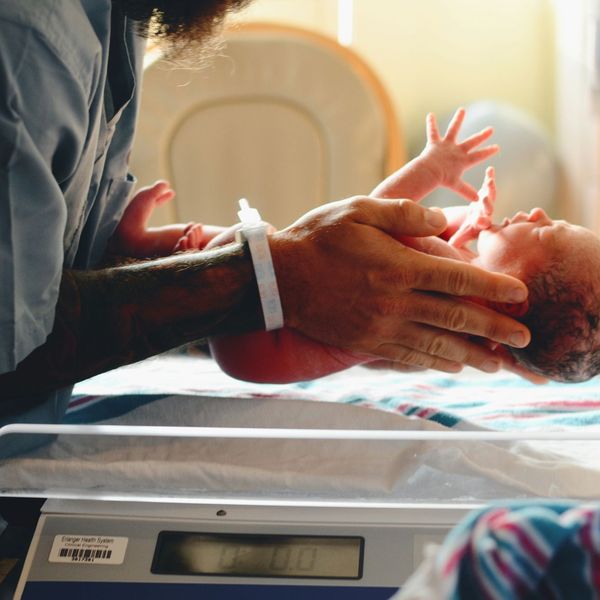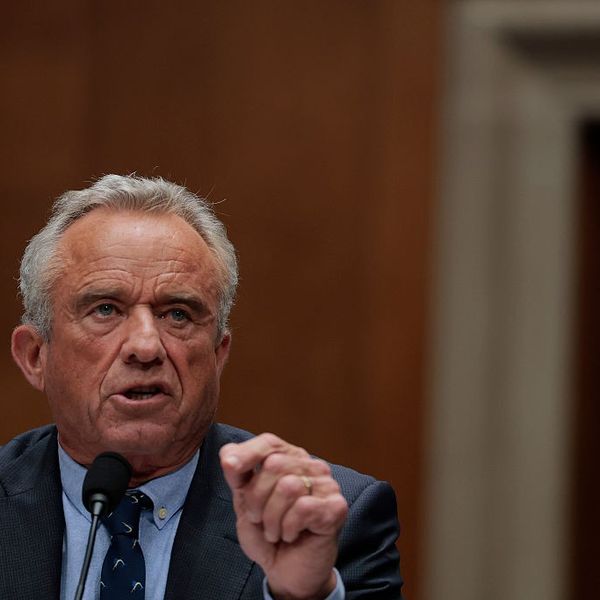
Chicago Teachers Union members and supporters join a car caravan outside Chicago Public Schools headquarters on July 22, 2020. (Photo: Max Herman/NurPhoto via Getty Images)
Public Health Experts Denounce New CDC Document Pushing School Reopenings as 'Politically Driven' and 'Irresponsible'
"With outbreaks raging in the U.S., this can spell disaster."
Public health experts are warning that a new Centers for Disease Control and Prevention document strongly touting the benefits of reopening schools in the fall while downplaying the risks paints a politically motivated and misleading picture of the science that could put students, educators, and entire communities in danger of contracting Covid-19 as infections surge nationwide.
The document, titled "The Importance of Reopening America's Schools This Fall," was posted on the CDC's website Thursday as part of a broader set of resources and tools designed to help school administrators, teachers, parents, and others safely navigate the process of resuming in-person instruction.
Experts said much of the new material released by the CDC's is reasonable and helpful, discussing the importance of in-person learning for child development while also detailing the serious risks involved in reopening schools amid a global pandemic. (The full package of resources released by CDC Thursday can be viewed here.)
"CDC: you do not need to convince Americans about the importance of in-person schooling. We get it. We need you to guide us on the science and how we can safely reopen. Guidelines should be based on public health--not political considerations."
--Dr. Leana Wen, George Washington University
But the document openly advocating school reopenings drew condemnation from experts who characterized it as clearly driven by a political agenda rather than science and concern for the health of students, school faculty, and the broader public.
"This just seems irresponsible," tweeted Michael Mina, an epidemiologist and immunologist at the Harvard School of Public Health. "With outbreaks raging in the U.S., this can spell disaster."
The CDC document heavily emphasizes the significance of in-person instruction for children, particularly those "with heightened behavioral needs"--a point that neither public health experts nor educators dispute. What alarmed experts was the document's failure to discuss in detail the possible health impact reopenings could have on school faculty members and communities.
"There is almost no epidemiology in this," tweeted Caitlin Rivers, an epidemiologist at Johns Hopkins Center for Health Security. "There are only two paragraphs on the science, and one of those is mostly devoted to flu."
"There is no mention of the risk of severe disease for teachers and staff, who are also part of the school community," Rivers added. "There is only passing, vague mention of mitigation measures to reduce the risk of transmission. Same for community prevalence."
The document focuses largely on the potential health risks that Covid-19 poses to children, a topic of ongoing debate among scientists and medical professionals. "The best available evidence indicates if children become infected, they are far less likely to suffer severe symptoms," the document states. "Children appear to be at lower risk for contracting Covid-19 compared to adults."
Mina noted that even if it is true that children are at lower risk from Covid-19, that "does not translate into low risk of causing outbreaks and infecting adults and at-risk populations."
Dr. Leana Wen, visiting professor at George Washington University, tweeted that the CDC does "not need to convince Americans about the importance of in-person schooling."
"We get it," Wen wrote. "We need you to guide us on the science and how we can safely reopen. Guidelines should be based on public health--not political considerations."
\u201c.@CDCgov: you do not need to convince Americans about the importance of in-person schooling. We get it. We need you to guide us on the science & HOW we can safely reopen. Guidelines should be based on public health--not political considerations.\n\nhttps://t.co/NZpgMESBI6\u201d— Leana Wen, M.D. (@Leana Wen, M.D.) 1595610740
The CDC's new resources come just over two weeks after President Donald Trump complained on Twitter that the agency's guidelines for reopening schools are too "tough" and "expensive." Trump and Education Secretary Betsy DeVos are aggressively pressuring schools to resume in-person classes in the fall and threatening to withhold federal funding from schools that remain closed due to Covid-19 fears.
Following the president's tweet, CDC Director Robert Redfield said his agency would release additional materials to assist schools with reopening but would not alter its existing guidelines, which recommend that students wear face coverings and remain six feet apart, among other precautions.
Julia Marcus, an infectious disease epidemiologist at Harvard Medical School, criticized the document pushing school reopenings as "likely politically driven" and highlighted the some of the more useful information posted by the CDC on Thursday:
\u201cHere's the guidance for K-12 administrators on preparing to open schools, including considerations related to community spread and best practices for prevention. https://t.co/UpNK7P9E8Y\u201d— Julia Marcus, PhD, MPH (@Julia Marcus, PhD, MPH) 1595562633
\u201cHere's the guidance on the use of cloth face coverings for schools, including scenarios where they're recommended and strategies to support students of various ages in wearing masks. https://t.co/5CrY4hrkOf\u201d— Julia Marcus, PhD, MPH (@Julia Marcus, PhD, MPH) 1595562633
\u201cHere's the guidance on screening for symptoms in schools, which is essentially not recommended. https://t.co/EkzietQ8IU\u201d— Julia Marcus, PhD, MPH (@Julia Marcus, PhD, MPH) 1595562633
\u201cHere's a tool to help parents make decisions about sending their kids to school. https://t.co/P6oCx97FTW\u201d— Julia Marcus, PhD, MPH (@Julia Marcus, PhD, MPH) 1595562633
\u201cHere's a set of checklists for parents who are preparing for in-person schooling, remote learning, or a hybrid. https://t.co/llaQbIpDdf\u201d— Julia Marcus, PhD, MPH (@Julia Marcus, PhD, MPH) 1595562633
"It sure would be easier if the CDC could speak directly to the public instead of just quietly posting things on their labyrinth of a website," Marcus tweeted.
An Urgent Message From Our Co-Founder
Dear Common Dreams reader, The U.S. is on a fast track to authoritarianism like nothing I've ever seen. Meanwhile, corporate news outlets are utterly capitulating to Trump, twisting their coverage to avoid drawing his ire while lining up to stuff cash in his pockets. That's why I believe that Common Dreams is doing the best and most consequential reporting that we've ever done. Our small but mighty team is a progressive reporting powerhouse, covering the news every day that the corporate media never will. Our mission has always been simple: To inform. To inspire. And to ignite change for the common good. Now here's the key piece that I want all our readers to understand: None of this would be possible without your financial support. That's not just some fundraising cliche. It's the absolute and literal truth. We don't accept corporate advertising and never will. We don't have a paywall because we don't think people should be blocked from critical news based on their ability to pay. Everything we do is funded by the donations of readers like you. Will you donate now to help power the nonprofit, independent reporting of Common Dreams? Thank you for being a vital member of our community. Together, we can keep independent journalism alive when it’s needed most. - Craig Brown, Co-founder |
Public health experts are warning that a new Centers for Disease Control and Prevention document strongly touting the benefits of reopening schools in the fall while downplaying the risks paints a politically motivated and misleading picture of the science that could put students, educators, and entire communities in danger of contracting Covid-19 as infections surge nationwide.
The document, titled "The Importance of Reopening America's Schools This Fall," was posted on the CDC's website Thursday as part of a broader set of resources and tools designed to help school administrators, teachers, parents, and others safely navigate the process of resuming in-person instruction.
Experts said much of the new material released by the CDC's is reasonable and helpful, discussing the importance of in-person learning for child development while also detailing the serious risks involved in reopening schools amid a global pandemic. (The full package of resources released by CDC Thursday can be viewed here.)
"CDC: you do not need to convince Americans about the importance of in-person schooling. We get it. We need you to guide us on the science and how we can safely reopen. Guidelines should be based on public health--not political considerations."
--Dr. Leana Wen, George Washington University
But the document openly advocating school reopenings drew condemnation from experts who characterized it as clearly driven by a political agenda rather than science and concern for the health of students, school faculty, and the broader public.
"This just seems irresponsible," tweeted Michael Mina, an epidemiologist and immunologist at the Harvard School of Public Health. "With outbreaks raging in the U.S., this can spell disaster."
The CDC document heavily emphasizes the significance of in-person instruction for children, particularly those "with heightened behavioral needs"--a point that neither public health experts nor educators dispute. What alarmed experts was the document's failure to discuss in detail the possible health impact reopenings could have on school faculty members and communities.
"There is almost no epidemiology in this," tweeted Caitlin Rivers, an epidemiologist at Johns Hopkins Center for Health Security. "There are only two paragraphs on the science, and one of those is mostly devoted to flu."
"There is no mention of the risk of severe disease for teachers and staff, who are also part of the school community," Rivers added. "There is only passing, vague mention of mitigation measures to reduce the risk of transmission. Same for community prevalence."
The document focuses largely on the potential health risks that Covid-19 poses to children, a topic of ongoing debate among scientists and medical professionals. "The best available evidence indicates if children become infected, they are far less likely to suffer severe symptoms," the document states. "Children appear to be at lower risk for contracting Covid-19 compared to adults."
Mina noted that even if it is true that children are at lower risk from Covid-19, that "does not translate into low risk of causing outbreaks and infecting adults and at-risk populations."
Dr. Leana Wen, visiting professor at George Washington University, tweeted that the CDC does "not need to convince Americans about the importance of in-person schooling."
"We get it," Wen wrote. "We need you to guide us on the science and how we can safely reopen. Guidelines should be based on public health--not political considerations."
\u201c.@CDCgov: you do not need to convince Americans about the importance of in-person schooling. We get it. We need you to guide us on the science & HOW we can safely reopen. Guidelines should be based on public health--not political considerations.\n\nhttps://t.co/NZpgMESBI6\u201d— Leana Wen, M.D. (@Leana Wen, M.D.) 1595610740
The CDC's new resources come just over two weeks after President Donald Trump complained on Twitter that the agency's guidelines for reopening schools are too "tough" and "expensive." Trump and Education Secretary Betsy DeVos are aggressively pressuring schools to resume in-person classes in the fall and threatening to withhold federal funding from schools that remain closed due to Covid-19 fears.
Following the president's tweet, CDC Director Robert Redfield said his agency would release additional materials to assist schools with reopening but would not alter its existing guidelines, which recommend that students wear face coverings and remain six feet apart, among other precautions.
Julia Marcus, an infectious disease epidemiologist at Harvard Medical School, criticized the document pushing school reopenings as "likely politically driven" and highlighted the some of the more useful information posted by the CDC on Thursday:
\u201cHere's the guidance for K-12 administrators on preparing to open schools, including considerations related to community spread and best practices for prevention. https://t.co/UpNK7P9E8Y\u201d— Julia Marcus, PhD, MPH (@Julia Marcus, PhD, MPH) 1595562633
\u201cHere's the guidance on the use of cloth face coverings for schools, including scenarios where they're recommended and strategies to support students of various ages in wearing masks. https://t.co/5CrY4hrkOf\u201d— Julia Marcus, PhD, MPH (@Julia Marcus, PhD, MPH) 1595562633
\u201cHere's the guidance on screening for symptoms in schools, which is essentially not recommended. https://t.co/EkzietQ8IU\u201d— Julia Marcus, PhD, MPH (@Julia Marcus, PhD, MPH) 1595562633
\u201cHere's a tool to help parents make decisions about sending their kids to school. https://t.co/P6oCx97FTW\u201d— Julia Marcus, PhD, MPH (@Julia Marcus, PhD, MPH) 1595562633
\u201cHere's a set of checklists for parents who are preparing for in-person schooling, remote learning, or a hybrid. https://t.co/llaQbIpDdf\u201d— Julia Marcus, PhD, MPH (@Julia Marcus, PhD, MPH) 1595562633
"It sure would be easier if the CDC could speak directly to the public instead of just quietly posting things on their labyrinth of a website," Marcus tweeted.
Public health experts are warning that a new Centers for Disease Control and Prevention document strongly touting the benefits of reopening schools in the fall while downplaying the risks paints a politically motivated and misleading picture of the science that could put students, educators, and entire communities in danger of contracting Covid-19 as infections surge nationwide.
The document, titled "The Importance of Reopening America's Schools This Fall," was posted on the CDC's website Thursday as part of a broader set of resources and tools designed to help school administrators, teachers, parents, and others safely navigate the process of resuming in-person instruction.
Experts said much of the new material released by the CDC's is reasonable and helpful, discussing the importance of in-person learning for child development while also detailing the serious risks involved in reopening schools amid a global pandemic. (The full package of resources released by CDC Thursday can be viewed here.)
"CDC: you do not need to convince Americans about the importance of in-person schooling. We get it. We need you to guide us on the science and how we can safely reopen. Guidelines should be based on public health--not political considerations."
--Dr. Leana Wen, George Washington University
But the document openly advocating school reopenings drew condemnation from experts who characterized it as clearly driven by a political agenda rather than science and concern for the health of students, school faculty, and the broader public.
"This just seems irresponsible," tweeted Michael Mina, an epidemiologist and immunologist at the Harvard School of Public Health. "With outbreaks raging in the U.S., this can spell disaster."
The CDC document heavily emphasizes the significance of in-person instruction for children, particularly those "with heightened behavioral needs"--a point that neither public health experts nor educators dispute. What alarmed experts was the document's failure to discuss in detail the possible health impact reopenings could have on school faculty members and communities.
"There is almost no epidemiology in this," tweeted Caitlin Rivers, an epidemiologist at Johns Hopkins Center for Health Security. "There are only two paragraphs on the science, and one of those is mostly devoted to flu."
"There is no mention of the risk of severe disease for teachers and staff, who are also part of the school community," Rivers added. "There is only passing, vague mention of mitigation measures to reduce the risk of transmission. Same for community prevalence."
The document focuses largely on the potential health risks that Covid-19 poses to children, a topic of ongoing debate among scientists and medical professionals. "The best available evidence indicates if children become infected, they are far less likely to suffer severe symptoms," the document states. "Children appear to be at lower risk for contracting Covid-19 compared to adults."
Mina noted that even if it is true that children are at lower risk from Covid-19, that "does not translate into low risk of causing outbreaks and infecting adults and at-risk populations."
Dr. Leana Wen, visiting professor at George Washington University, tweeted that the CDC does "not need to convince Americans about the importance of in-person schooling."
"We get it," Wen wrote. "We need you to guide us on the science and how we can safely reopen. Guidelines should be based on public health--not political considerations."
\u201c.@CDCgov: you do not need to convince Americans about the importance of in-person schooling. We get it. We need you to guide us on the science & HOW we can safely reopen. Guidelines should be based on public health--not political considerations.\n\nhttps://t.co/NZpgMESBI6\u201d— Leana Wen, M.D. (@Leana Wen, M.D.) 1595610740
The CDC's new resources come just over two weeks after President Donald Trump complained on Twitter that the agency's guidelines for reopening schools are too "tough" and "expensive." Trump and Education Secretary Betsy DeVos are aggressively pressuring schools to resume in-person classes in the fall and threatening to withhold federal funding from schools that remain closed due to Covid-19 fears.
Following the president's tweet, CDC Director Robert Redfield said his agency would release additional materials to assist schools with reopening but would not alter its existing guidelines, which recommend that students wear face coverings and remain six feet apart, among other precautions.
Julia Marcus, an infectious disease epidemiologist at Harvard Medical School, criticized the document pushing school reopenings as "likely politically driven" and highlighted the some of the more useful information posted by the CDC on Thursday:
\u201cHere's the guidance for K-12 administrators on preparing to open schools, including considerations related to community spread and best practices for prevention. https://t.co/UpNK7P9E8Y\u201d— Julia Marcus, PhD, MPH (@Julia Marcus, PhD, MPH) 1595562633
\u201cHere's the guidance on the use of cloth face coverings for schools, including scenarios where they're recommended and strategies to support students of various ages in wearing masks. https://t.co/5CrY4hrkOf\u201d— Julia Marcus, PhD, MPH (@Julia Marcus, PhD, MPH) 1595562633
\u201cHere's the guidance on screening for symptoms in schools, which is essentially not recommended. https://t.co/EkzietQ8IU\u201d— Julia Marcus, PhD, MPH (@Julia Marcus, PhD, MPH) 1595562633
\u201cHere's a tool to help parents make decisions about sending their kids to school. https://t.co/P6oCx97FTW\u201d— Julia Marcus, PhD, MPH (@Julia Marcus, PhD, MPH) 1595562633
\u201cHere's a set of checklists for parents who are preparing for in-person schooling, remote learning, or a hybrid. https://t.co/llaQbIpDdf\u201d— Julia Marcus, PhD, MPH (@Julia Marcus, PhD, MPH) 1595562633
"It sure would be easier if the CDC could speak directly to the public instead of just quietly posting things on their labyrinth of a website," Marcus tweeted.

